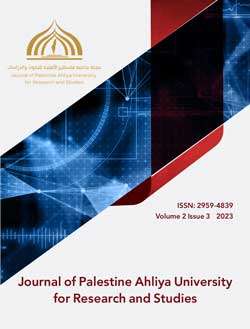Industrial Operation Performance: Unveiling the Influence of Information Quality, Sharing, and Customer Relationships
DOI:
https://doi.org/10.59994/pau.2023.3.104Keywords:
Supply Chain Practices, Operation Performance, Information Sharing, Information Quality, Customer RelationshipsAbstract
The foundation of optimal and proficient operational performance is contingent upon the caliber of information. Organizations that prioritize the acquisition, examination, and application of high-quality information are more likely to optimize their operational processes, save costs, enhance customer satisfaction, and achieve a competitive edge in their respective industries. The main objective of the study was to identify the effect of business supply chain practices (information Sharing, information quality, and Customer Relationships) and operation performance in the Jordanian food industries sector in the al Hassan industrial estate. To answer the problem of the study a questionnaire was developed and distributed to 67 employees. The descriptive and analytical approaches were used to attain the study's goal. The study found a statistically significant effect of supply chain practices (information Sharing, information quality, & Customer Relationships) on operation performance. The implementation of efficient customer relationship (CR) strategies has been observed to yield numerous favorable consequences for enterprises. For example, it is improved operational efficiency, decreased costs, increased revenue, and the construction of a more sustainable company framework.
Downloads
References
Ageron, B., Lavastre, O., & Spalanzani, A. (2013). Innovative supply chain practices: the state of French companies. Supply Chain Management: An International Journal, 18(3), 265-276.
Ahmad, B. N., & Zailani, S. (2007). The effect of information quality on buyer-supplier relationships: a conceptual framework. In Proceedings of 7th Global Conference on Business and Economics, Rome, Italy.
Ajay, A., & Maharaj, M. (2010). Effects of information sharing within supply chains. Proceeding to SACLA.
Akinlabi, B. H. (2021). Effect of inventory management practices on operational performance of flour milling companies in Nigeria. International Academy Journal of Management, Marketing and Entrepreneurial Studies, 8(2), 137-174.
Al-Sa’di, A. F., Abdallah, A. B., & Dahiyat, S. E. (2017). The mediating role of product and process innovations on the relationship between knowledge management and operational performance in manufacturing companies in Jordan. Business Process Management Journal, 23(2), 349-376.
AlZou'bi, M. J., KHader, L. F. A., Ahmed, E. Y., & Bashatweh, A. D. (2021). The integrative relationship between traditional and modern performance measures: an applied study on commercial banks listed in Amman stock exchange. Academy of Accounting and Financial Studies Journal, 25(4), 1-10.
Azim, M. D., Ahmed, H., & Khan, A. S. (2015). Operational performance and profitability: An empirical study on the Bangladeshi Ceramic companies. International Journal of Entrepreneurship and Development Studies, 3(1), 63-74.
Bashatweh, A. D., & Ahmed, E. Y. (2020). Financial Performance Evaluation of the commercial banks in Jordan: Based on the CAMELS Framework. International Journal of Advanced Science and Technology, 29(5), 985-994.
Bashatweh, A. D., Abutaber, T. A., AlZu’bi, M. J., KHader, L. F. A., Al-Jaghbir, S. A., & AlZoubi, I. J. (2021, November). Does Environmental, Social, and Governance (ESG) Disclosure Add Firm Value? Evidence from Sharia-Compliant Banks in Jordan. In International Conference on Business and Technology (pp. 585-595). Cham: Springer International Publishing.
Cook, L. S., Heiser, D. R., & Sengupta, K. (2011). The moderating effect of supply chain role on the relationship between supply chain practices and performance: An empirical analysis. International Journal of Physical Distribution & Logistics Management, 41(2), 104-134.
DeLone, W. H., & McLean, E. R. (1992). Information systems success: The quest for the dependent variable. Information systems research, 3(1), 60-95.
JCI. (2023). The Food, Catering, Agricultural, and Livestock Industries Sector. Retrieved from: https://jci.org.jo
Lee, Y. W., Strong, D. M., Kahn, B. K., & Wang, R. Y. (2002). AIMQ: a methodology for information quality assessment. Information & management, 40(2), 133-146.
Li, S., Ragu-Nathan, B., Ragu-Nathan, T. S., & Rao, S. S. (2006). The impact of supply chain management practices on competitive advantage and organizational performance. Omega, 34(2), 107-124.
Lin, F. R., Huang, S. H., & Lin, S. C. (2002). Effects of information sharing on supply chain performance in electronic commerce. IEEE Transactions on engineering management, 49(3), 258-268.
Nunnally, J. C. (1978). Psychometric Theory: 2nd Ed. USA, McGraw-Hill.
Rashed, C. A. A., Azeem, A., & Halim, Z. (2010). Effect of information and knowledge sharing on supply chain performance: a survey based approach. Journal of Operations and Supply Chain Management, 3(2), 61-77.
Sekaran, U., & Bougie, R. (2010). Research for business–a skill building approach. John-Wiley and Sons, New York, NY, 4, 401-415.
Sukati, I., Hamid, A. B., Baharun, R., & Yusoff, R. M. (2012). The study of supply chain management strategy and practices on supply chain performance. Procedia-Social and Behavioral Sciences, 40, 225-233.
Sundram, V. P. K., Chandran, V. G. R., & Bhatti, M. A. (2016). Supply chain practices and performance: the indirect effects of supply chain integration. Benchmarking: An International Journal, 23(6), 1445-1471.
Szozda, N., & Werbińska-Wojciechowska, S. (2013). Influence of The Demand Information Quality on Planning Process Accuracy in Supply Chain. Case Studies. LogForum, 9(2), 73-90.

Downloads
Published
How to Cite
Issue
Section
License
Copyright (c) 2023 Journal of Palestine Ahliya University for Research and Studies

This work is licensed under a Creative Commons Attribution 4.0 International License.
مجلة جامعة فلسطين الاهلية للبحوث والدراسات تعتمد رخصة نَسب المُصنَّف 4.0 دولي (CC BY 4.0)











